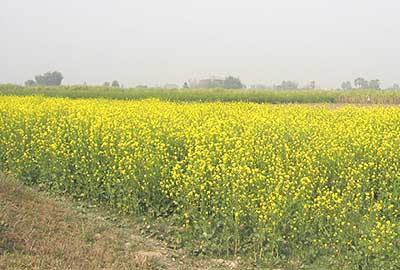|
23/04/2018
Farmers Producers Organizations in Bihar: An Overvierw
|
Bihar had over 161 lakh farm holdings as per the Agricultural Census, 2011. Of this, about 147 lakh were marginal farm holdings i.e. having individual operational land holding of less than 1 hectare while another about 10 lakh were small farm holdings with individual operational land holding size less than 2 hectares. Therefore, the marginal and small farm holdings together accounted for a whopping 96.60 percent of the total farm holdings in Bihar in 2010-11. However, their share in the state’s total operated area was 76 percent. Average size of operational land holding of each farm varied from 0.25 hectare in the case of the marginal farm holdings 1.25 hectares for small farm holdings to 15 hectares in the case of the large farm holdings, which worked out to 0.39 hectare for all farm holding categories taken together. Such is the predominance of marginal and small farms in Bihar agriculture. As per estimates, about 3 lakh new marginal farms are being added every year due to continued division of farm holdings.
Most farms do not have access to consumer market and, therefore, are forced to sell their produce to the numerous intermediaries operate in rural area. This reduces their profit margin, making the farming business, in most cases, a non-viable one. Therefore, at one hand, we have ever increasing prices of agricultural inputs, and on the other, profit margin of the farms are not increasing proportionately, leading to a situation of crisis where the small farms struggle to survive. The agricultural sector needs an urgent overhaul of governance to ensure agricultural growth keeps pace with the overall growth of the economy, guarantee food, particularly the weaker section of society and assure enhanced livelihood for the people engaged in farming. As the small farms struggle to get access to inputs, market and credit they need a level playing field to be able to compete with other market players in equal terms. Due to factors beyond their control and absence of institutions to safeguard their interests, they are unable to integrate with the agricultural value chains, fight the risks and vulnerabilities such as commodity price volatility, crop failure, insect pest-attacks, natural calamities etc. on their own. Considering the legal environment and political sensitivity of the agricultural sector, there is a gradual recognition that one of the ways to overcome the challenges as described above, could be to collectivize the farmers into Producer Organizations (POs) - be they are producer companies, cooperatives or, any other form. The approach is Considered to be helpful in integrating the farmers directly, through producer companies to market, for both, inputs and output.
The most of FPOs located in Muzaffarpur district are engaged in marketing of Litchi, mango and Green Gram. This activity was started in the last year and they are trying to link the fruits and vegetable marketing with BIG BAZAR which will help increasing the production and marketing of fruits and vegetables in the hinterland of these FPOs. Winter maize has emerged as an important commercial crop in north Bihar and its further expansion depends on efficient marketing of the crop. Almost all FPOs of north Bihar, are concentrated their efforts to marketing of maize.
They lack of leadership initiative to run the FPOs in professional manner. FPO requires an external agent to train their directors and chairmen in professional manner. There is an urgent need to have strong Farmer Producer Organizations working closely with market to safeguard the interest of the small and marginal farmers. If the state government fails to strengthen the FPOs in the infant stage it will lose opportunity to develop rural sector through this institutional innovation
Please enable JavaScript to view the comments powered by Disqus.
|
|


